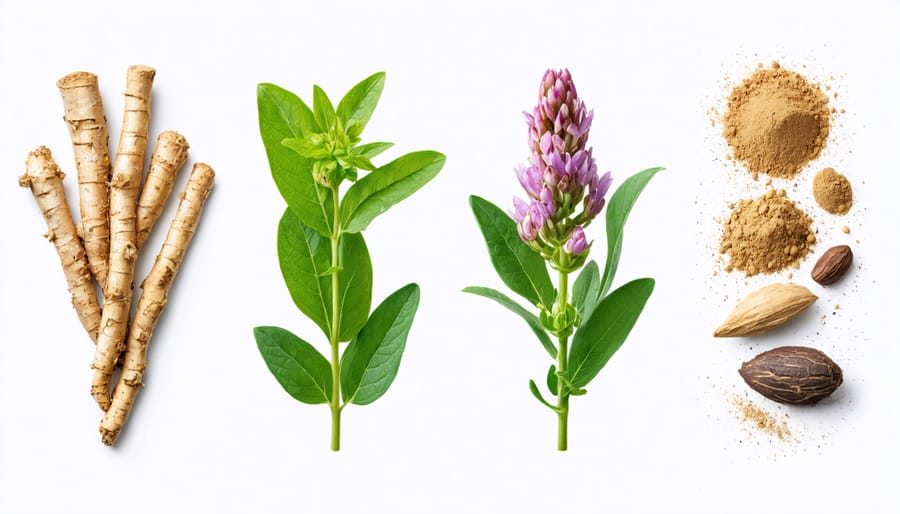
In a world where burnout and anxiety have become daily companions, ancient wisdom offers a powerful solution: adaptogenic herbs. These remarkable plants – from the stress-busting ashwagandha to the energy-balancing rhodiola – have supported human wellness for millennia, working quietly yet effectively to help our bodies adapt to life’s constant pressures.
Think of adaptogens as your body’s personal stress managers, working behind the scenes to maintain balance whether you’re racing to meet deadlines or juggling family responsibilities. Unlike quick-fix solutions, these herbs don’t just mask symptoms – they work with your body’s natural systems to build resilience over time.
As someone who transformed from a stressed-out professional to a more centered individual through these botanical allies, I understand the game-changing potential of adaptogens. Whether you’re new to natural wellness or looking to deepen your stress-management toolkit, these herbs offer a gentle yet powerful path to better balance.
Let’s explore how these remarkable plants can help you navigate modern life’s challenges while maintaining your cool – starting with the most effective options and simple ways to incorporate them into your daily routine.
Understanding Adaptogens: Nature’s Stress-Fighters
How Adaptogens Work with Your Body
Think of adaptogens as your body’s personal stress management team. When stress hits (whether it’s a hectic work deadline or a challenging workout), your body goes through something called the general adaptation syndrome – basically, your stress response. This is where adaptogens shine!
These remarkable herbs work like a thermostat for your stress levels, helping your body find its sweet spot. When you’re feeling overwhelmed, they can help calm things down, and when you’re feeling sluggish, they can give you a gentle boost. It’s like having a friend who knows exactly what you need at any given moment.
The science behind it is fascinating yet simple: adaptogens help regulate your hypothalamic-pituitary-adrenal (HPA) axis – your body’s stress command center. They support your adrenal glands, which produce stress hormones like cortisol, helping to maintain a healthy balance. Instead of the typical peaks and crashes that come with stress, adaptogens help create a more sustainable energy flow throughout your day.
What makes them truly special is that they work gradually and gently, supporting your body’s natural ability to handle stress rather than forcing an immediate change.

Why Modern Women Need Adaptogens
In today’s fast-paced world, women are juggling more responsibilities than ever before. From demanding careers and family obligations to constant digital connectivity and social pressures, our bodies are experiencing stress in ways our ancestors never imagined. This modern lifestyle creates a unique set of challenges that can deplete our energy, affect our mood, and impact our overall wellbeing.
That’s where adaptogens come in as nature’s answer to modern stress. These powerful herbs work with your body’s natural systems to help maintain balance and resilience. Unlike quick-fix solutions, adaptogens offer a personalized nutrition approach that addresses the root causes of stress-related symptoms.
As women, we often prioritize everyone else’s needs before our own. But incorporating adaptogens into our daily routine is a form of self-care that doesn’t require a complete lifestyle overhaul. Whether you’re a busy mom, a career professional, or both, these herbs can help you maintain energy levels, support emotional balance, and boost your body’s natural ability to cope with stress – all while fitting seamlessly into your existing routine.

Top Stress-Busting Adaptogens for Your Kitchen
Ashwagandha: The Calm Inducer
As someone who’s struggled with stress-induced insomnia, discovering ashwagandha was a game-changer for my evening routine. This powerful adaptogenic herb, traditionally used in Ayurvedic medicine, has earned its reputation as nature’s calm inducer, and for good reason.
Ashwagandha works by helping your body manage stress more effectively, reducing cortisol levels (our primary stress hormone) and promoting a sense of calm without making you feel drowsy during the day. Regular users often report improved sleep quality, reduced anxiety, and better mental clarity – benefits I’ve experienced firsthand.
The best part? Incorporating ashwagandha into your daily routine is surprisingly simple. You can find it in powder form, which blends beautifully into morning smoothies or golden milk lattes. My personal favorite is adding a teaspoon to my evening moon milk recipe: warm almond milk, a touch of honey, and a sprinkle of cinnamon. For those who prefer convenience, capsules are readily available at most health food stores.
Start with a small dose (around 300mg) and gradually increase it as your body adjusts. While ashwagandha is generally safe, it’s always wise to check with your healthcare provider before adding any new supplement to your routine, especially if you’re pregnant or taking medications. Remember, consistency is key – give it a few weeks to experience the full benefits of this stress-busting herb.
Holy Basil: Your Kitchen’s Sacred Herb
When I first discovered holy basil (also known as Tulsi), it felt like finding a hidden treasure in my kitchen garden. This aromatic herb, revered in Ayurvedic tradition, brings more to the table than just its delightful flavor – it’s a powerful adaptogen that can help your body manage stress naturally.
Unlike its Italian cousin sweet basil, holy basil has a unique peppery, clove-like taste that adds depth to both savory dishes and calming teas. I love steeping fresh holy basil leaves in hot water for 5-10 minutes to create a soothing tea that’s perfect for winding down after a long day. Add a touch of honey and a squeeze of lemon, and you’ve got yourself a comforting ritual that not only tastes amazing but helps combat stress too.
In cooking, holy basil shines in stir-fries, soups, and rice dishes. Try adding a handful of fresh leaves toward the end of cooking to preserve its beneficial properties. My favorite quick recipe is a simple holy basil pesto: blend the leaves with olive oil, garlic, and nuts of your choice for a stress-busting spread that works wonderfully on whole grain toast or stirred into pasta.
Beyond its culinary uses, holy basil can help boost your immune system, improve mental clarity, and promote better sleep – making it truly worthy of its “sacred” status in your kitchen arsenal.
Rhodiola: Energy Without the Jitters
I discovered Rhodiola during a particularly stressful period at work, and it’s been a game-changer for my energy levels without the uncomfortable coffee jitters. This remarkable adaptogenic herb, which thrives in the harsh climates of Arctic regions, has been used for centuries to combat fatigue and boost mental clarity.
Unlike caffeine, Rhodiola provides sustained energy without the crash. It’s particularly effective when taken in the morning, helping you maintain steady focus throughout the day. I love that it supports both physical and mental stamina – perfect for those busy days when you’re juggling work deadlines, family commitments, and trying to squeeze in a workout.
To incorporate Rhodiola into your daily routine, start with a high-quality supplement containing standardized extract. Begin with a lower dose (around 200mg) and observe how your body responds. You can also find Rhodiola in some herbal tea blends, though supplements typically provide more consistent dosing.
My favorite way to use Rhodiola is taking it first thing in the morning with breakfast. Pro tip: pair it with a protein-rich meal to help steady your energy levels even further. Just remember to take occasional breaks from any adaptogen to maintain its effectiveness. If you’re pregnant, nursing, or on medication, always check with your healthcare provider before adding Rhodiola to your routine.
Maca: The Hormone Harmonizer
Maca has been my go-to adaptogenic ally for years, and I love how versatile this root powder can be in the kitchen! Think of it as nature’s hormone-balancing superfood with a subtle butterscotch-like flavor that plays well with so many ingredients.
My favorite morning ritual involves blending a teaspoon of maca into my breakfast smoothie – it pairs beautifully with banana, cacao, and almond milk for a hormone-happy start to the day. For those afternoon energy slumps, try stirring maca into your coffee or matcha latte for an extra adaptogenic boost without the jitters.
Get creative with your baking! I’ve found that maca adds a lovely malted flavor to homemade energy balls – mix it with dates, nuts, and a splash of vanilla for the perfect afternoon pick-me-up. It’s also fantastic in overnight oats, sprinkled over yogurt parfaits, or blended into homemade nut butter.
Pro tip: Start with just ½ teaspoon daily and gradually work your way up to 1-2 teaspoons. Some of my readers swear by adding maca to their post-workout protein shakes, while others love stirring it into hot chocolate for a cozy evening treat. Remember, consistency is key with adaptogens, so find ways to incorporate maca that truly delight your taste buds and fit seamlessly into your daily routine.
Easy Ways to Add Adaptogens to Your Daily Routine
Morning Ritual Recipes
Start your day with these nourishing adaptogenic recipes that combine powerful stress-fighting herbs with delicious ingredients. These recipes aren’t just about nutrition – they’re an opportunity to practice mindful eating practices and embrace mindful cooking practices for a more balanced morning routine.
Golden Adaptogenic Latte
– 1 cup plant-based milk
– 1 tsp ashwagandha powder
– 1 tsp turmeric
– 1/2 tsp cinnamon
– Honey to taste
Blend ingredients until smooth and warm gently on the stovetop.
Stress-Relief Smoothie Bowl
– 1 frozen banana
– 1 cup mixed berries
– 1 scoop plant-based protein
– 1 tsp maca powder
– 1 tsp holy basil powder
– Splash of almond milk
Blend until smooth and top with granola, coconut flakes, and fresh fruit.
Adaptogenic Overnight Oats
– 1/2 cup rolled oats
– 1 cup plant milk
– 1 tsp reishi powder
– 1 tbsp chia seeds
– 1 tbsp maple syrup
– Pinch of salt
Mix ingredients in a jar, refrigerate overnight, and top with nuts and fresh fruit in the morning.
These recipes are designed to be simple yet effective, perfect for busy mornings when you need an extra boost of calm and clarity. Remember to start with small amounts of adaptogens and adjust according to your body’s needs.

Stress-Relief Sips and Snacks
Ready to transform your stress-relief routine into something deliciously simple? Let’s explore some quick and tasty ways to incorporate adaptogens into your daily life without adding more to your already full plate.
Start your morning with a comforting Golden Milk Latte by blending warm plant-based milk with ashwagandha powder, turmeric, and a touch of honey. For an afternoon pick-me-up, try my personal favorite: a refreshing Holy Basil Iced Tea with a splash of lemon and mint. These drinks aren’t just delicious; they’re perfect stepping stones toward sustainable healthy eating habits that support your well-being.
For grab-and-go options, keep these stress-busting snacks handy:
– Energy balls made with dates, nuts, and reishi powder
– Smoothie packets pre-portioned with maca and your favorite fruits
– Trail mix enhanced with cordyceps-dusted nuts
– Homemade granola bars featuring rhodiola powder
I love keeping a batch of adaptogenic trail mix in my desk drawer for those hectic workdays. The combination of crunchy nuts and subtle adaptogenic herbs provides both satisfaction and support when stress levels rise.
Remember, consistency is key with adaptogens, so choose options you genuinely enjoy. Start with one or two recipes that appeal to you most, and gradually expand your adaptogenic menu as you discover your favorites. These simple additions can make a world of difference in how you handle daily stress.
Starting your adaptogenic journey doesn’t have to feel overwhelming. As someone who was once skeptical about herbal supplements, I understand the hesitation you might be feeling. But I’ve learned that small, consistent steps can lead to meaningful changes in how we manage stress.
Begin by choosing just one adaptogen that resonates with your specific needs. Whether it’s ashwagandha for anxiety and sleep, or rhodiola for energy and focus, start with a single herb and observe how your body responds. I remember starting with a simple ashwagandha tea in the evenings, and it gradually became a cherished part of my wind-down routine.
Remember that adaptogens work best when combined with other stress-management practices. Consider creating a morning ritual that includes your chosen adaptogen along with meditation, journaling, or gentle movement. Keep a wellness journal to track your progress and any changes you notice in your stress levels and overall well-being.
Most importantly, be patient with yourself. Adaptogens aren’t quick-fix solutions – they work subtly and gradually to help your body adapt to stress. Give yourself at least a few weeks to experience their benefits, and don’t hesitate to adjust your routine as needed.
You’ve already taken the first step by learning about these powerful herbs. Trust your intuition, listen to your body, and embrace this journey toward better stress management. Remember, every small step counts in creating a more balanced, resilient you.



